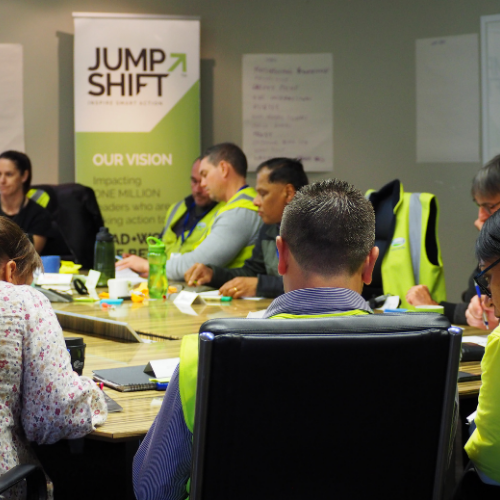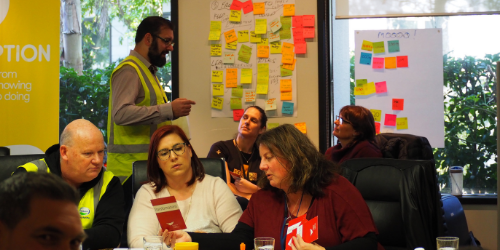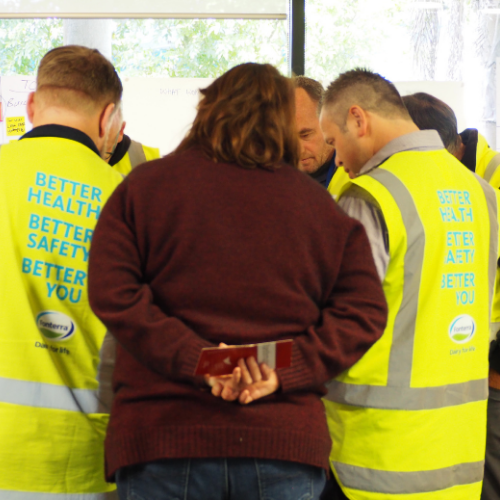Leadership Essentials Programme at Fonterra
Best use of a blended learning programme
The Fonterra Leadership Essentials programme delivered in partnership with JumpShift was recognised at the Brandon Hall Excellence Awards in 2021 as winning bronze under best use of a blended learning programme in the learning and development category.
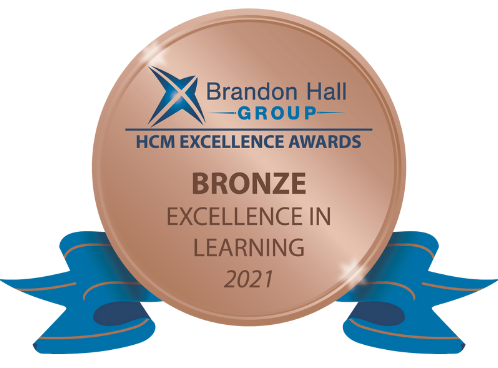
The Challenge
Fonterra is a Co-operative dairy company owned by more than 11,000 New Zealand dairy farmers and operates across more than 140 countries globally. It is the world’s leading exporter of dairy products, responsible for more than a third of international dairy trade.
Lucy Hogarth, General Manager of Leadership Experience at Fonterra was tasked with scaling excellent but localised leadership initiatives to reach all of Fonterra’s 2000+ frontline leaders across their different geographies and roles around the world.
Why? Like many organisations, Fonterra sees leadership as a key enabler of performance, where leadership development consistently came up in engagement metrics reports as an area that could be improved.
“Some of the core leadership pieces that we know are so important just weren’t happening. Leaders were not having things like courageous conversations, giving feedback or holding development conversations with their people.”
Lucy and the stakeholders of the programme made a courageous decision to invest in the more than 2000 frontline leaders at Fonterra rather than a ‘start at the top and hope it trickles down approach’. This bottom-up approach was used by the Co-operative to have maximum impact, where frontline leaders create changes within themselves and their teams, while also influencing those above them. Managers are very sensitive to getting pushed from those who report to them. You could say it’s a ‘rise up’ approach!
This ambitious approach required Lucy and her partners to embrace complexity.
“The ability to create an experience with all the complexities and size of our business involved, along with a growing leadership culture, meant we needed this programme to be delivered well in a multitude of different ways, in-person and fully virtual.”
Given scale, minimising per person cost was a key constraint along with four non-negotiable deliverables:
- Connection between cohorts (building new relationships)
- Facilitation experts to guide the experience
- Support for leaders to put their insights into practice
- Consistent experience for all leaders regardless of delivery mode
The Approach
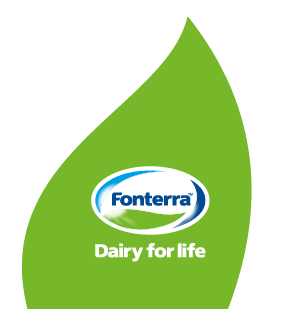
Lucy partnered up with JumpShift to design the approach. Central to the design of the leadership development experience was the idea of an ‘ecosystem’, supporting leaders moving from ‘me’ to ‘we’. Rather than a single event or a set of workshops, the development would happen by creating a set of conditions that made development likely.
“The ecosystem is key. This includes the internal coaches, the Adeption platform, the facilitators, myself as a ‘guardian’ of the programme and the senior sponsors in the business, who love learning and are passionate about being a part of pulling people up the ladder as well as leading it down. We need all these pieces of the puzzle.”
Two modes of deployment were settled on;
- Blended face-to-face. A blended series of face-to-face workshops with asynchronous ‘workouts’ on Adeption.
- Blended fully virtual. A blended series of shorter virtual workshops heavily supported by asynchronous ‘workouts’ on Adeption.
Regardless of mode, the key elements of the programme for Lucy were:
- Readiness assessments and 360 feedback for participants before they started; this shifted from a mindset of ‘here is something you need to do’, to a mindset of, ‘if you want it here is an opportunity’.
- Briefing calls before a workshop to prime participants of their experience and managers of the expectations for them to coach, mentor and support.
- Participants completing workouts on the Adeption platform and connecting in with their coaches and one up managers via the platform and app throughout.
- Participants having a direct line of contact to the senior sponsors of the programme.
- Facilitation structured to provide insights rather than answers.
- Building psychological safety within participant groups.
- Mixing groups from different roles and locations to create new diverse networks.
Finally, the introduction of vertical development was also an important aspect for Lucy to include in the leadership programme.
“The integration of vertical development has made a huge difference to the way these leaders think about leadership. The design ensured that regardless of whether they know what it is, the leaders experience the conditions for vertical development.”
The Impact
It is early days for the deployment but results are extremely promising.
“Every single manager of participants on our pilot said that the confidence and capability of their people has grown due to the experience”.
Further, results strongly suggest that the groups with a blended fully virtual delivery mode is out performing the face-to-face blended mode. This is an important insight given our current world of social distancing. Data is still coming in but the key reason for this is the ecosystem approach so central to the design. When running a fully virtual group you can’t rely on the ‘workshop’ to fix everything and to be the central event. A virtual session can be good but because it isn’t such a ‘peak’ event, everyone’s (participants, facilitators, managers etc) mindset moves from the workshop being the key thing to being just part of the ecosystem.
Another apparent advantage of fully virtual delivery, is it enabled more diverse groups of participants.The virtual groups contain leaders from different geographies and roles giving them access to previously unattainable networks and perspectives.
“Virtually the leaders don’t have much time together, so they reach out to build networks outside of the sessions we run, it’s their responsibility. In many ways our virtual sessions just let each of them know they exist. The design focusses on issues and challenges they face so they are comfortable doing this in service of work. It’s a great coaching moment when they realise this as it builds self-responsibility.”
The ecosystem approach is also yielding other benefits. Lucy says that the leadership programme at Fonterra not only had a positive impact on the participants who were involved but also on the coaches, managers and sponsors involved.
“The coaches were able to experience the programme and refresh their own learning, understanding that no matter where you are on your journey there is always something you can take away.”
“There were the one-up managers who up-leveled themselves based on their leaders doing the same. The sponsors involved were also building networks between levels of leaders that may not have happened before. At any point in their career at Fonterra the participants can now feel like it’s okay to contact this person even if it’s outside the realms of the programme.”
The focus on an ecosystem rather than any one element is what has made the leadership programme at Fonterra a success in Lucy’s eyes. Each element on it’s own has the ability to greatly support these frontline leaders in their growth and yet when put together as a whole it has managed to create a thriving culture of change and growth.
The Numbers
Since launching in 2019 the Leadership Essentials programme at Fonterra has seen the graduation of over 50 cohorts through the 12 month programme with 25 cohorts of frontline leaders still on their journey. From those who have graduated, the ability for leaders to lead themselves, their teams and those across the co-op has increased significantly.
- Ability to lead self increase 49%
- Ability to lead others increase 48%
- Ability to reflect and sustain change increase 62%
